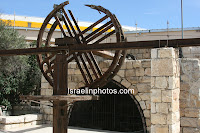"From Dan to Beersheba", a distance of about 250 km (Judg.20:1; 1 Chr.21:2; 2 Sam.24:2), became the usual way of designating the whole Promised Land and passed into a proverb. Mark Twain wrote in his book "The Innocents": Dan was the northern and Beersheba the southern limit of Palestine - hence the expression "from Dan to Beersheba". It is equivalent to the phrases "from Maine to Texas" - "from Baltimore to San Francisco". Those expressions and that of the Israelites both mean the same - great distance. With their slow camels and asses, it was about a seven days' journey from Dan to Beersheba - say a hundred and fifty or sixty miles - it was the entire length of their country, and was not to be undertaken without great preparation and much ceremony. When the Prodigal traveled to "a far country", it is not likely that he went more than eighty or ninety miles.
And Abimelech said to Abraham, What mean these seven ewe lambs which thou hast set by themselves? And he said, For these seven lambs shalt thou take of my land, that they may be a witness unto me, that I have digged this well. Wherefore he called that place Beersheba: because there they sware both of them. (Gen.21:29).
The trilateral root (Shin - Bet - Ayin) carries three fundamental meanings:
a. Seven; b. Full/Complete; c. Oath/Sware.
The name Beersheba means Beer (well) of the Sheba (Oath). Thus Scripture displays the Number Seven with its associated meaning of Oath.
The modern city dwarfs an old well that may be the Biblical one. It is called the "Abraham Well", it is found in a small museum. A big tamarisk grows beside it, in memory of the one that Abraham planted.
The city was gradually abandoned after the First Temple Period. In 1900, the Turkish authorities built a small town to serve as an administrative centre for the Negev's Bedouin tribes. During World War I the Germans connected it by rail with the Sinai Peninsula and in 1917 the town fell to the British General Allenby in his northward advance. During the War of Independence, the Egyptians who strongly fortified it held Beersheba; but Israeli forces in "Operation Ten Plagues" overcame them on 2 October 1948.
Today Beersheba is the Capital of Israel's Southern District. Its largest industries (ceramics, sanitary ware, chemicals, etc) exploit Negevs minerals.
The city has several academic scientific and cultural institutions, among them the Negev Hospital, The Ben Gurion University of the Negev, which grants undergraduate and advanced degrees in a wide range of disciplines. Attached to the university is the Arid zone Research Center, which conducts studies on the desert and in particular, on means of utilizing this large region productively. In addition Beersheba has every Thursday morning a market for the Bedouins, but we don’t see so many Bedouins over there nowadays.







